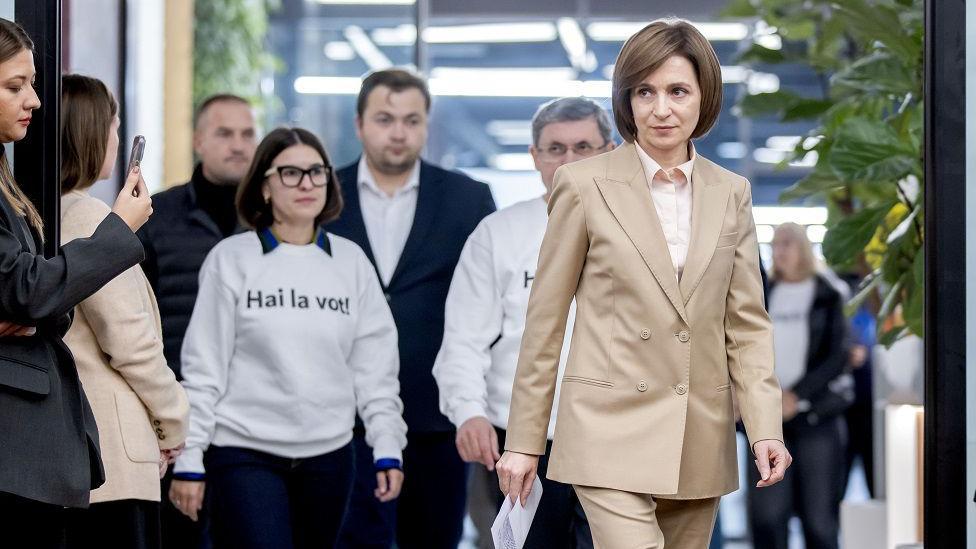Moldova’s recent referendum on constitutional changes aimed at solidifying its commitment to European Union (EU) membership is witnessing an unexpectedly contentious battle, with the voting statistics indicating a near tie: Yes votes at 49.6% and No votes at 50.3%, with 97% of ballots counted. This close result has taken many observers by surprise, given that prior polls had suggested a comfortable victory for the Yes camp. The incumbent pro-EU president, Maia Sandu, denounced the narrow margin as indicative of foreign interference, specifically accusing Russian forces of orchestrating efforts to sway public opinion and finance votes against the EU alignment interest. The voting results not only influence the constitutional amendment but also serve as a barometer for the presidential elections occurring on the same day, positioning the nation in a broader geopolitical context: prioritizing EU membership over traditional ties with Russia.
In her analysis of the vote, President Sandu described the narrow defeat as an “unprecedented assault on democracy,” asserting evidence that roughly 300,000 votes were bought by organized crime networks collaborating with foreign entities. Despite Russia’s outright denial of involvement in these allegations, Sandu’s claims fuel concerns about election integrity in a nation that has historically tumbled between Eastern and Western influences. The referendum was designed as a decisive step toward EU membership, but its non-legally binding nature complicates the narrative. Consequently, while accession discussions with the EU will proceed, the prospects of using the referendum as a clear mandate are now called into question, creating a more precarious path ahead for Moldova regarding its aspirations.
The results of the presidential elections present further complications for Sandu, as she emerged with only 41% of the initial vote, a considerably smaller margin than expected, setting her up to face a challenging second round against Aleksandr Stoianoglo, a pro-Russian candidate who garnered 27%. The political landscape is therefore poised for a shift, particularly if Stoianoglo consolidates support from other candidates. With public sentiment deeply divided between a European future and Russian allegiance, the months ahead will likely shape the core of Moldova’s domestic and foreign policies.
Amidst these developments, the atmosphere at Sandu’s electoral headquarters reflected disappointment as her supporters were left disheartened by the unfolding election results. Her campaign, characterized by support for EU integration, was marking a pivotal moment in Moldova’s long-term trajectory. As results began to reveal a closer race than anticipated, campaign strategists speculated that the early tallies from rural sectors, traditionally less pro-EU, skewed the projections. Many supporters opted to leave the headquarters early, symbolizing a sense of defeat that overshadowed previous political optimism.
While a significant portion of the populace expressed a desire for EU integration, especially among younger voters, many carry complex sentiments toward Russia’s historical influence over Moldova. A vocal segment of voters articulated their commitment to a European-oriented future, emphasizing the importance of stability, economic prospects, and geopolitical alignment. Statements from these constituents highlighted a growing appetite for distancing themselves from Moscow’s legacy while pursuing democratic and economic reforms consistent with EU standards.
Despite Voter turnout exceeding 50% and thus meeting necessary criteria for validity, the atmosphere was marred by broader allegations of vote-buying. Reports emerged from polling stations in the breakaway region of Transnistria, where instances of cash incentives promised for votes against EU accession were documented. Furthermore, allegations linger against Ilan Shor, a fugitive businessman accused of channeling illicit funds toward undermining the referendum’s objectives. He explicitly encouraged citizens to vote against Sandu, reflecting a coordinated effort to diminish pro-EU sentiment and restore Russian influence. This manipulation casts shadows over Moldova’s democratic processes and accentuates the pivotal role foreign influence plays in its tumultuous political landscape.
In summary, Moldova stands at a critical juncture, with the results of the referendum and presidential elections reflecting a deeply fragmented electorate. The outcomes are not just numbers; they signify a national crossroads, forcing citizens to grapple with choices that extend beyond mere political parties to profound geopolitical implications. With foreign interference allegations and the enduring struggle for EU integration, Moldova’s future remains uncertain, compelling its leadership to navigate a complex and often fraught political terrain.

